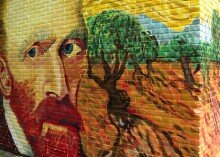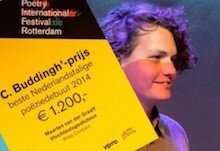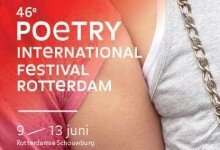‘In the arms of the world’
Damir Šodan believes that ‘real’ poetry refuses to be obscurely self-referential and “desires to surrender to the world”. This conviction lies behind his own choices and practice as a writer and translator of poetry and his optimism about the state of contemporary Croatian poetry, as he explains to Miloš Đurđević.
You began publishing poetry in the mid-1990s, displaying quite an elaborate style and highly distinctive poetics, which over the course of time have been recognised as very much your own.
I began writing and translating poetry almost simultaneously while a student of English literature in Zagreb, Croatia, in the mid-1980s. At that time, my friendship with Vojo Šindolić, a poet and translator, had a profound impact on me. I was literally devouring his translations of American Beat writers and articles on rock music, even back when I was in high school. Everything about Vojo, from the pencils he used, the type of shoes he wore, and last but not least his transatlantic friendships and acquaintances with some of the greatest Beat authors, were to me the epitome of absolute cool, so I had no choice but to embrace him as my own personal guru, and he remains a big influence and a friend to this day. I was also greatly inspired by the two anthologies published at the time, the first being Trip, the anthology of American poetry compiled and translated by the Belgrade translator duo, Bajac and Kopicl, and the second being Zlatna knjiga američke poezije (The Golden Book of American Poetry), which had been put together in Zagreb by two outstanding Croatian men of letters, Antun Šoljan and Ivan Slamnig, whose brilliant translations prompted me to check out their own writing, which I found to be stylistically superb, deadly serious and at the same time endlessly entertaining. Under the tutorship of those two outstanding erudites, so to speak, keenly aware of the Croatian literary heritage, I delved even deeper into our own literary tradition and began extensively reading Croatian literature, checking out everyone I could. As a result I remained permanently enchanted by the power and expressiveness of the Croatian language. Soon I shyly and clandestinely began writing myself, but in my case, the internship with literary tradition turned into a long and thorough process, so it took me a good ten years before I mustered enough courage to approach editors with the idea of publishing some of my poems and translations.
What do you think of the reception of your work and its evaluation by critics?
I am glad that critics recognised an individual style and poetics in my poetry. Because I think that poetry itself is a kind of inner journey that leads one through the tunnel of the self towards the light of the outer world. The very title of my first book, Glasovne promjene (Sound Changes) was meant as a tentative indication of the ‘plurality of interests’ of the lyrical subject rather than as a reflection of the subject’s potential disunion, decenteredness or dismemberment, as suggested by various mainstream postmodernist theories. Some critics correctly diagnosed a slight regression, if not ‘retardation’, towards modernism, while those of more traditional provenance found elements of passatismo and even ‘pure lyricism’. However, I think that a nod towards modernism is more recognisable on the stylistic rather than on an ‘ideological’ level. I liked and read a good deal of Montale and Ungeretti, and found Italian hermetism in general quite appealing. I liked its austerity, its smartness and above all its humbleness.
What is your motivation when writing poetry and writing in general?
As regards to motivation as a primary impulse, I think it is mostly irrational. Inspiration, or whatever one may call it, is in the final instance, always a form of compulsion. Since I have been meddling in music for quite a long time, poetry has always been my favourite choice when it comes to literature. I felt its closeness to music. Like jazz musicians, good poets also have their own sound. For instance, when we read classics like Robert Frost, W. H. Auden, Joseph Brodsky or Derek Walcott, it becomes quite clear right away. Even the poetry of Danijel Dragojević*, whose expression leans on phenomenological reductionism, has its own recognisable sound. Apart from this ‘audiophile’ aspect, what drew me towards poetry was also its renegade resistance to the logocentric ‘terror of sense’, as the postmodernist would say. Because poetry can allow you to indulge in your own idiosyncrasies more than any other genre. For instance, the way in which the mind of an avant-garde language poet works would elsewhere be proclaimed as utter madness. As Philip Wheelwright said: “Poetry is never entirely sober; its acquaintance with the language of sobriety is casual and varying.” Despite the various schools and movements throughout history, poetry essentially remains in the domain of extreme individualism and, indeed, at least to me, it represents freedom of speech in the most elemental sense.
How do you see contemporary Croatian poetry?
I think that the second part of the 1990s marked a turning-point for Croatian poetry. It is marked by its final exodus from under the umbrella of the ‘semiotic’ logos, which was essentially, at least the way I understand it, associated with the rule of the poststructuralist aesthetic theories in criticism which strongly if not decisively reflected on the writing itself. At that point in history (the Homeland War being officially over in 1995), Croatian poetry suddenly and audaciously embraced the representational discourse that had previously been reserved almost exclusively for prose. In other words, it made a resolute step forward outside the realm of language towards the realm of the ‘real’ world. It was a brave and humble gesture signaling that the era of self-indulgent language experimenting was finally coming to an end. Poetry threw itself back into the arms of the world and this was perceived as an acte extraordinaire. It seemed as if people had forgotten that poetry can actually be comprehensible and even enjoyable, so they were delighted when poets finally conceded that they are at least equally interested in the ‘physics’ as well as in the ‘metaphysics’ of our existence. The humanism of poetry was thus reaffirmed and it began corresponding with reality, thanks mainly to the so-called ‘new realist’ poets such as Tatjana Gromača, but also thanks to your own efforts displayed in the volumes Žetva (Harvest) and U zrcalu (In the Mirror), which introduced a certain unadorned plainness in expression and insisted on urban (perhaps even ‘urbanistic’) existentialism. The fact that those poets were not members of any poetic school, but that they reached for similar poetic means rather spontaneously is quite remarkable. Admittedly, there were other authors before who utilized similar poetics, such as Boris Maruna and Dalibor Cvitan, but those were honorable exceptions to the ruling poetics of language and reflexive provenance, whereas now we are witnessing the creation of new poetic ‘templates’ if not norms. In the words of Peter Sloterdijk, we may conclude that after the semiotic ‘mobilization’ ensued the mimetic ‘disarmament’. Conclusively, by appropriating a new technique for poetry, poets of the new realistic sensibility expertly sensed the pulse of the reading public, which nowadays is much more intrigued by an author’s personal experience than by his commanding erudition or linguistic spiel. It seems to me that nowadays one can observe the emergence of a new empathy in the reception of literature in general. It appears that finally experience has taken precedence over imagination and erudition.
You are also known as a connoisseur and translator of American poetry. How did your interest in American poetry influence your own poetry?
I started translating American poetry out of pure passion, believing with Allen Ginsberg that “What began as desire will end wiser.” In other words, it was love at first sight. What drew me towards American poetry first and foremost was its incredible versatility and flamboyance, which is almost unparalleled. In fact, the early announcement of Walt Whitman, “I contain multitudes”, can easily be applied to the whole of American poetry. The entire continent of American poetry stretching from language experiments to existentialist confessionals, from stern academic Puritanism to liberal streetwise romanticism, can easily awaken the instinct of an explorer in a keen enthusiast. But what I personally found incredibly interesting in American poetry was its spontaneity, its resistance to abstractions and insistence on concrete imagery. Those aspects have remained crucial characteristics of American poetry ever since the introduction of imagism by Ezra Pound and William Carlos Williams. Moreover, it is from there that its humour stems and it is equally represented in the works of both the abstract ‘antinomians’ such as John Ashbery, concrete ‘realists’ like Charles Bukowski, or ‘reflexivists’ such as Billy Collins.
Does the division between older and younger poets and their respective poetic interests have any real foundation? How could it be recognised in national poetry?
I don’t know if I am able to give an accurate answer to this question, but what I can say is that what I perceive as ‘old’, if not old-fashioned, in Croatian poetry is the notion of a poet as a godsend bard, or the ‘shepherd’ of national ‘being’, who is the only one qualified to read the augury of his nation’s destiny. This highly conservative modus operandi, and I am afraid, vivendi too, has ruled for ages and it simply cannot be completely overthrown or erased. On the other hand, what I perceive as ‘young’ is everything that is interested in life and in the world around us, whether stylistically controlled and withdrawn or flamboyantly exulted, as in the case of Milko Valent, as long as it is anchored in everyday speech as a verifier of the urgency of utterances. The above-mentioned concept may well be proof of our cultural parochialism, or perhaps deeply rooted conservativism. Personally, I think that the division between old and young goes much more along the demarcation line that separates different worldviews, rather than by age groups.
All one had to do before to gain the status of a first-rate wordsmith was to appear intellectually sharp and linguistically playful, whereas today the potential reading public wants to know a little bit about the author and his persona. In other words, they want a bit of an existential input. Poetry today must either come from the world or at least arrive there. The world should always be either the point of departure or the point of arrival. A good deal of today’s poetry refuses to remain self-referentially incomprehensible and desires to surrender to the world. As Donald Revell said: “Poetry is the vehicle, the world is the purpose. The world is not an afterthought of the poem.”
You have become well known to the public since the launch of the book and the subsequent staging of your truly extraordinary play Zaštićena zona (Safe Area) for which you were received an award. How do you see that experience in the context of your writing in general?
Safe Area was a good lesson, first and foremost for having taught me how easily an ideology-clouded media can manipulate a text, once it is out of the writer’s hands. The play itself was a black comedy with mixed elements of highbrow and lowbrow intended to ridicule the very notion of ethnic cleansing as the continuation of brotherhood and unity by other means – to paraphrase Clausewitz’s description of war. However, some found it offensive to their national pride, some felt the theme was somewhat ‘obsolete’, whereas others luckily embraced it with silent horror and cathartic laughter. What I have personally found beneficial there is the reminder that a man has to stand behind his words and deeds, no matter what.
Is there any connection between playwriting and poetry, and if so, what is it?
There are many similarities between drama and poetry that are not easily discernible at first sight, but I perceive both as action writing, figuratively speaking of course. It seems to me as though both of the ‘genres’ have been derived from the structure of myth, wherein one is supposed to assume the stance of an announcer of an absolute truth and that leaves very little space for decorum and description. The writing of prose on the other hand allows for much more freedom in that sense. It may sound paradoxical, but David Mamet once remarked that in playwriting “the content of what is being said is rarely carried by the connotation of the words. It is carried by the rhythm of the speech and the posture of the speaker and a lot of other things.” I think this partly holds for poetry as well. Somehow one feels that the underlying intent of a text will be carried out regardless, and in spite of, the ‘rhetoric’ manoeuvring of the poet, if the voice he is speaking in is right.
What are your plans? What are you working on now?
I have completed the translation of Raymond Carver’s collected poems into Croatian and it is currently being printed. Also pending publication is my translation into Croatian of Charles Simic’s selected poems. Most recently, I have translated selections from Billy Collins and Leonard Cohen. Mostarski Teatar Mladih, an independent theatre in Mostar, Bosnia and Herzegovina, will be staging my play Noć dugih svjetala (The Night of Fog Lights) in September. They will also publish a book of plays under the same title and I have composed and recorded a little theme tune for the performance – I just hope the director will accept it. I am also working on a new collection of poems.
* Danijel Dragojević (1934), poet, essayist and art critic, by common acknowledgement the most prominent contemporary Croatian poet.








